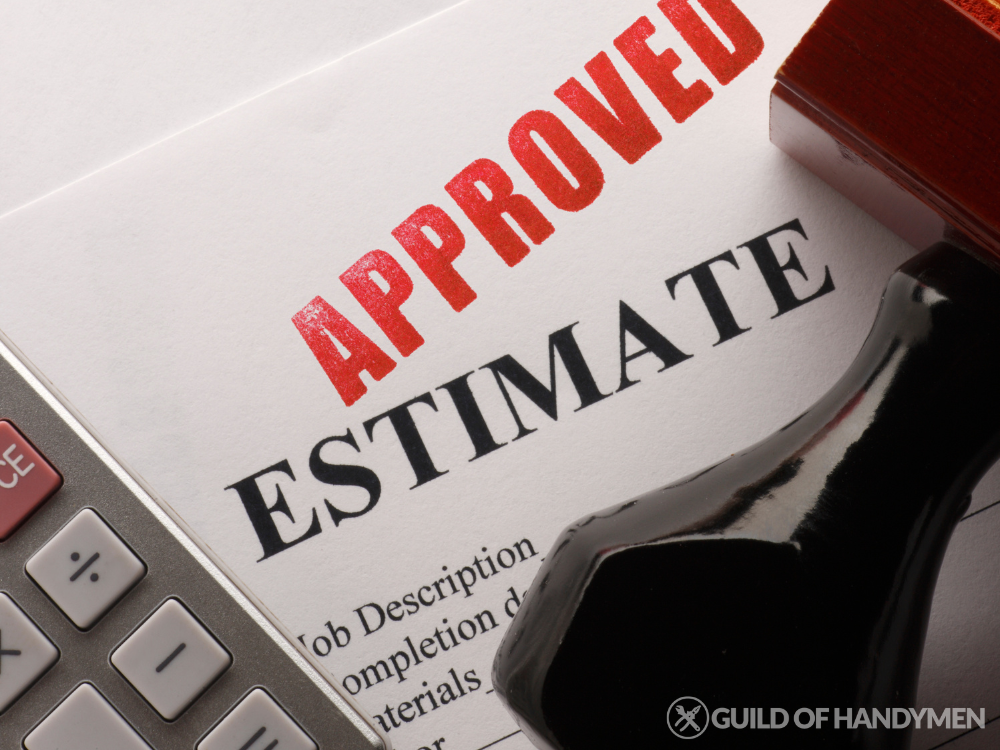When you need a handyman to tackle a home project, getting quotes and estimates is the first step. But it’s not always clear what you’re looking at, or how to compare different prices. Understanding the differences between quotes and estimates, and how to interpret them, can save you time, money, and frustration. Here’s what you need to know.
This blog is part of our series on how to hire a reliable handyman – sharing everything you need to know to get the best handyman for your needs.
Quotes vs. Estimates: What’s the Difference?
Before we dive deeper, let’s clarify a common confusion: the difference between a quote and an estimate. While they both give you an idea of cost, there are some important distinctions.
What Is an Estimate?
An estimate is an educated guess based on the handyman’s experience. It provides a rough idea of how much the job might cost, but it isn’t set in stone. Estimates are usually given when the full scope of the work can’t be precisely determined up front, or when there are variables that may impact the final cost.
- Best for: Projects with unpredictable elements, like repairing damage where the full extent is unknown.
- Common factors: Time, materials, unforeseen complications.
Tip: Always ask how much the estimate might vary and what could influence the final cost. Understanding potential variables helps avoid surprises.
What Is a Quote?
A quote is more exact. It’s a fixed price offer based on a clearly defined job description. Once accepted, the handyman is usually bound to that price unless the project scope changes significantly. Quotes often detail specific materials, labour costs, and timeframes.
- Best for: Projects with a well-defined scope, like painting a room or installing shelving.
- Things to check: Whether the quote includes materials, labour, VAT, and any disposal fees.
How to Compare Handyman Quotes and Estimates
With several quotes or estimates in hand, it’s time to compare them. But this isn’t just about picking the lowest number. Here are key factors to consider.
1. Breakdown of Costs
A good quote or estimate should break down the expenses into labour, materials, and other fees. This transparency helps you understand where your money is going.
- Labour costs: Some handymen charge hourly rates, while others may charge a flat fee for the whole project. Be clear on what’s included.
- Materials: Check if they’ve listed specific brands or quality levels for supplies. Cheaper materials could mean lower upfront costs, but they might not last.
- Extra fees: Travel expenses, waste removal, or additional work could be included or charged separately. Make sure you know what’s covered.
Example: Two quotes for a fence repair might look similar, but if one uses premium treated timber while the other doesn’t, the difference could affect durability.
2. Time Requirements
Time is money—especially when it comes to labour. Quotes should include a timeline or an estimated completion date.
- Hourly rates: If your handyman charges by the hour, understand how delays or complications will be handled. Ask what might cause time overruns.
- Project timelines: For bigger jobs, ask how many workers will be on-site and if they’ll be there full-time or split their time with other projects.
3. Contingency Plans
Ask your handyman about how they handle unforeseen issues. It’s especially relevant for estimates where the exact cost can fluctuate. Do they need your approval before going ahead with extra work? Or do they add contingency costs to cover the unexpected?
Pro Tip: If the estimate includes a contingency percentage, check if you can negotiate a cap on additional expenses.
Questions to Ask Your Handyman

It’s smart to ask questions before you commit to any quote or estimate. Here are a few essentials:
- How firm is this estimate or quote? Find out if the price is likely to change.
- What kind of materials will you use? Understand the quality and durability.
- How will changes to the project be handled? Ensure you’re notified before extra work starts.
- Is VAT included? If applicable, ask if taxes are factored into the total.
- Do you offer any guarantees? A good handyman will often guarantee their work for a certain period.
Evaluating the Quality of the Handyman
A cheap quote might seem appealing, but it’s worth considering the quality of the service. An experienced handyman may charge more, but you’ll likely benefit from fewer mistakes, better quality materials, and faster completion. Check reviews or ask for references to ensure you’re hiring someone reliable.
Remember: The cheapest option isn’t always the best. Consider the reputation, reliability, and track record of your handyman before making a decision.
Key Takeaways
- Understand the difference: Quotes are fixed prices, while estimates can vary depending on the job’s complexity and unpredictability.
- Compare details: Look at how costs are broken down, the materials specified, and whether time estimates are realistic.
- Ask questions: Don’t be afraid to ask your handyman for clarification to avoid hidden surprises down the line.
- Quality matters: Weigh the cost against the handyman’s experience and reputation to ensure long-lasting results.
Understanding how to read and compare quotes and estimates gives you confidence to manage home improvement projects efficiently. The clearer you are, the more likely you’ll be satisfied with the final result. Happy fixing!

